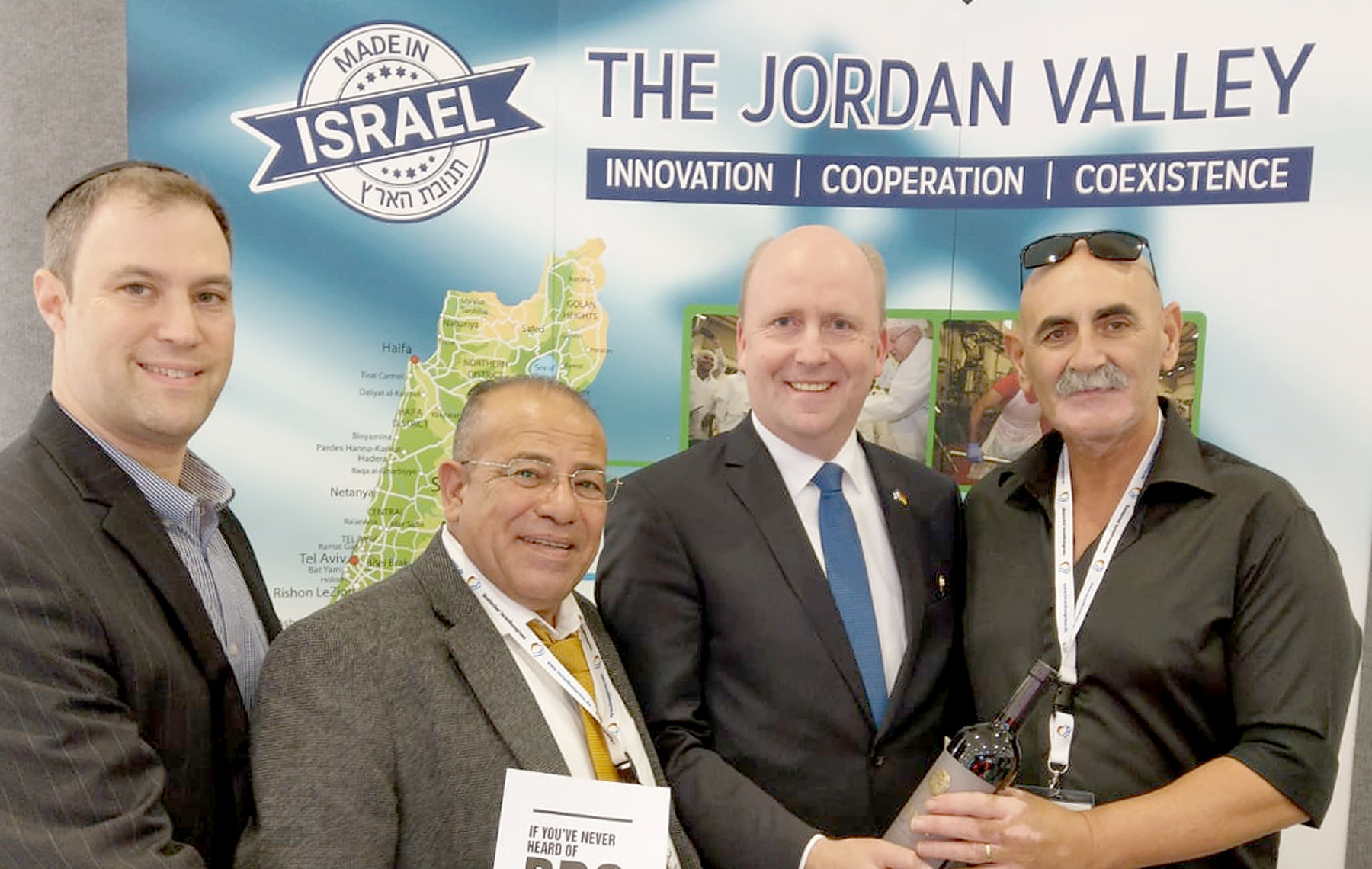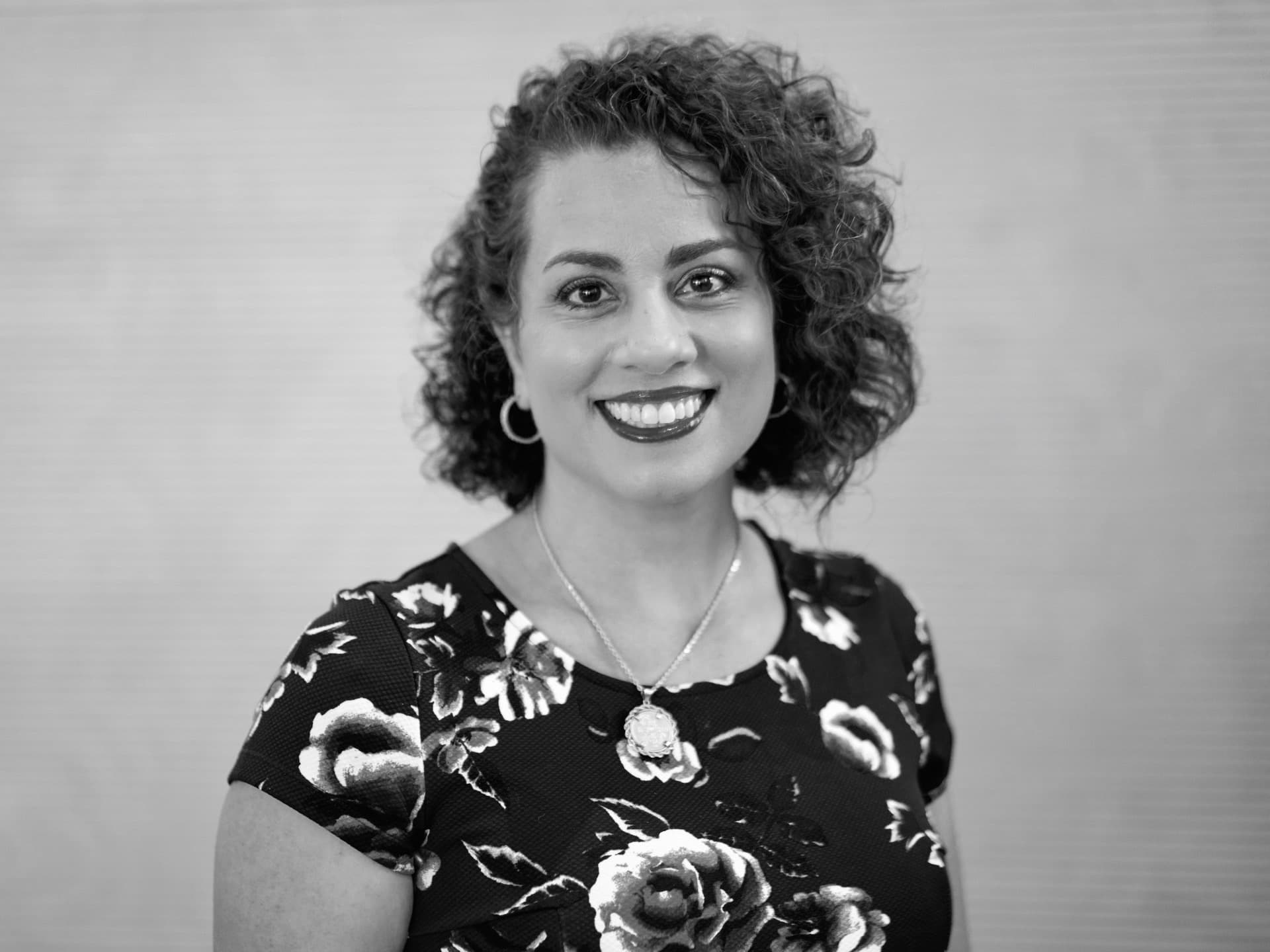 From left: mayor of Jordan Valley Regional Council David Elhayani, mayor of Frankfurt Uwe Becker, Palestinian human rights activist Basem Eid and Elie Pierpz.
Photo courtesy of Jordan Valley Regional Council
From left: mayor of Jordan Valley Regional Council David Elhayani, mayor of Frankfurt Uwe Becker, Palestinian human rights activist Basem Eid and Elie Pierpz.
Photo courtesy of Jordan Valley Regional Council Although Germany has developed a reputation as one of Israel’s strongest allies in the European Union, keynote speakers at the fifth Israel Congress recently held in Frankfurt criticized the host country’s recent failings on several fronts.
More than 3,000 people from across Europe attended the Nov. 25 event in one of the continent’s strongest displays of grassroots support for Israel.
Israel’s Minister of Strategic Affairs and Public Diplomacy Gilad Erdan, the highest-level Israeli official to address the gathering at the Frankfurt Convention Center, struck a conciliatory tone as the grandson of Auschwitz survivors, but he then rebuked Germany for funding nongovernmental organizations (NGOs) hostile to Israel and for clinging to the Iran deal.
As he expressed optimism for strong Israel-German relations, Erdan said his grandmothers “never imagined their grandson would be standing here in Frankfurt celebrating Israel and Germany’s friendship.” German Chancellor Angela Merkel, he added, “has been clear in rejecting attempts to delegitimize Israel, and the CDU (Christian Democratic Union), as you know, has labeled BDS (boycott, divestment and sanctions) coarse anti-Semitism.”
However, Erdan also called on Germany to lead the European Union in withholding funding of NGOs that indirectly support BDS efforts that seek to delegitimize Israel.
“Germany can and should lead such a reform in the [European Union] because German taxpayers shouldn’t be footing the bill for BDS,” he said. “German government funds are also still going, unfortunately, to [United Nations] bodies that openly promote the demonization and delegitimization of Israel.”
Keynote speaker Hillel Neuer, executive director of U.N. Watch, chastised Merkel’s government for joining anti-Israel regimes in voting for eight recent anti-Israel resolutions put forth by the U.N. General Assembly’s Special Political and Decolonization Committee. The resolutions condemned Israel’s treatment of Palestinians and called on Israel to return the Golan Heights to Syria.
“When we speak about the challenges of human rights today at the United Nations, it’s time for us to ask our leaders — and here in Germany — to ask [German foreign affairs minister] Heiko Maas and the government: It’s time to stand up for the true principles of human rights and not those that are distorted by dictatorships and their apologists.”
Maas sought to justify Germany’s U.N. voting record on Israel, particularly in the wake of criticism from fellow German parliament members, by saying Germany’s engagement softened the language of the resolutions.
Neuer mocked Maas’ justification. “Maybe Mr. Maas will help Israel more and support 100 resolutions against Israel. Wouldn’t that be wonderful? Ladies and gentlemen, this is nonsense,” he said to applause.
Maas has also been leading efforts to salvage the Iran Deal by finding workarounds against the United States’s renewed sanctions. In his address, Erdan emphasized Iran’s financing of terrorism in both Israel and Europe as well as Iran’s repeated death threats against Israel.
“It simply cannot be that, from the point of view of Germany, it is business as usual with Iran. Germany should join the American sanctions on Iran,” Erdan said to applause. “Rather than trying to get around them —because as I said Germany is a leader in Europe, and Germany, especially Germany, must show moral leadership on this issue.”
Unlike at the last Israel Congress two years ago, Merkel sent a video greeting, in which she praised Israel’s diversity and friendship, saying “preserving the memory of the betrayal of Germany of all civilized values that was the Shoah, and learning lessons for a good and peaceful co-existence is the enduring responsibility of Germany.”
“Germany can and should lead … reform in the European Union because German taxpayers should not be footing the bill for BDS.” — Gilad Erdan
Prime Minister Benjamin Netanyahu likewise sent a video greeting, saying German-Israel relations were stronger than ever. “We remember horrors,” he said. “We will never forget them, but despite the horrors of the past, we’ve transformed our relationship into a warm and constructive relationship.”
A highlight of the conference was a speech given by the former Miss Iraq, Sarah Idan, who made waves when she posed with Miss Israel, Adar Gandelsman, at the 2017 Miss Universe pageant. Idan, who called for peace between the people of both countries, voiced her most political statements yet, despite the string of death threats she continually receives from anti-Israel Iraqis.
Idan described the relentless anti-Israel bias she experienced while growing up in Baghdad. “They injected us with lies and fueled us with fear. It’s that same fear that won’t allow us to grow, and the same lack of trust that will keep us at war,” she said.
Idan moved to the Los Angeles area in 2009 after working as a translator for the U.S. army in Iraq. She traveled to Israel for the first time this summer.
“First, we must acknowledge vital facts, like the purpose behind every terrorist organization like Hamas or ISIS and the fact that they don’t care about a cause or a soul, and how we can stop them. That being said, Israel has a huge task — as well as Palestine, as well as the rest of the world — and that is to fight those who promote hatred and violence,” she said. “It may be hard to convince Arabs to accept people they’ve resented for ages, to co-exist, but I don’t think it’s impossible.”
Idan believes change can happen in Palestinian society, especially should Israel invest in educating Palestinians against hate and helping them improve their lives. “Slowly, but eventually, we are building a less violent generation,” she said.
For the first time, the Congress showcased products from Israeli settlements in Judea and Samaria, which are labeled as such by the European Union. Members of the Jordan Valley Regional Council, representing a region and agricultural industry tended by Israelis and Palestinians, sponsored a booth featuring wine, dates, treats and beauty products from the region.
Erdan raised a toast at the booth.
“In this region, both Jews and Palestinians live and work together in harmony,” he said. “It’s important for our friends in Europe to realize that the key to peace, stability and good neighborly relations between nations begins with economic development, especially in the joint industrial zones. Furthermore, the European continent has already suffered the effects of the ill-fated boycotts against Jewish products, and therefore should be wary and resist anti-Semitic actions of the BDS movement.”
Orit Arfa is a journalist and author based in Berlin.























 More news and opinions than at a Shabbat dinner, right in your inbox.
More news and opinions than at a Shabbat dinner, right in your inbox.